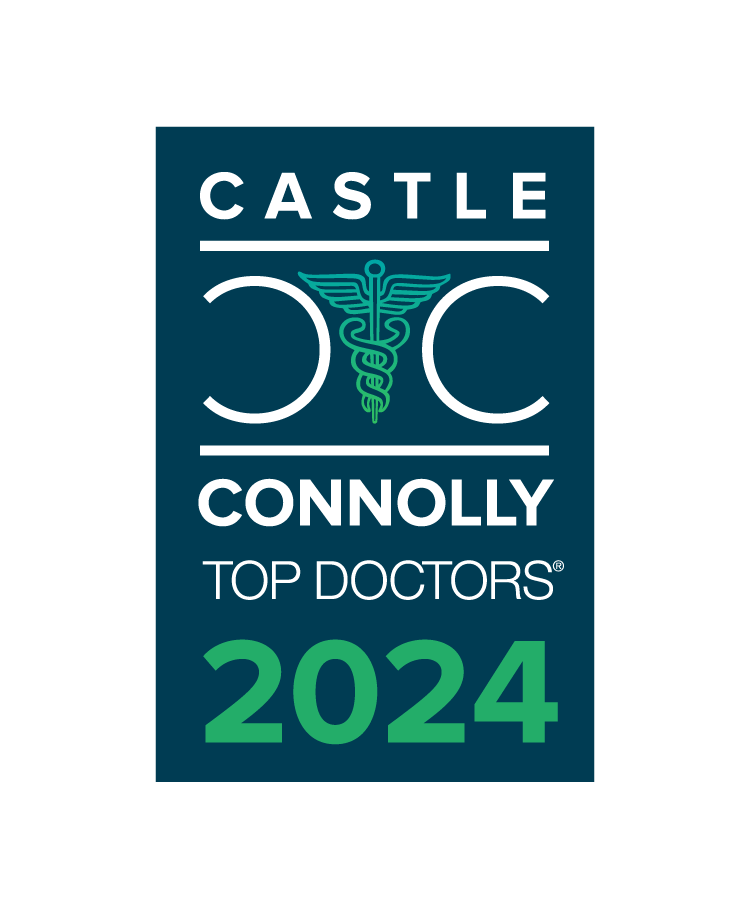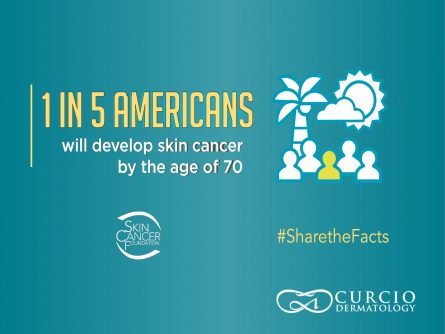Skin cancer is the most common form of cancer in the United States, with millions of new cases diagnosed every year (CDC). Because your skin is constantly exposed to sunlight, environmental factors, and ageing processes, it is especially vulnerable to changes that can become harmful over time.
In Nashville, where strong southern sun exposure is a year-round concern, prevention and early detection are critical. Regular skin cancer screenings can save lives by catching abnormalities early, when they are most treatable. This guide explains what skin cancer is, who is at risk, common warning signs, prevention strategies, and what to expect during a professional screening at Curcio Dermatology.
This article is for educational purposes only and should not replace professional medical advice. Always consult your dermatologist for diagnosis and treatment.
What is skin cancer?
Skin cancer occurs when skin cells begin to grow abnormally due to DNA mutations. These mutations are often triggered by ultraviolet (UV) radiation from sunlight or tanning beds, though they can also arise from genetic factors or a combination of the two (National Cancer Institute).
There are three primary types of skin cancer:
| Type of Skin Cancer | Where It Starts | Appearance | Aggressiveness |
|---|---|---|---|
| Basal Cell Carcinoma (BCC) | Basal cells in the skin’s lower epidermis | Pearly bump, waxy lesion, or scar-like area | Usually slow-growing, rarely spreads |
| Squamous Cell Carcinoma (SCC) | Squamous cells on skin’s surface | Scaly red patches, open sores, or wart-like growths | Can spread if untreated |
| Melanoma | Melanocytes (pigment-producing cells) | Irregular, multicolored moles or dark lesions | Most aggressive, can spread quickly to organs |
Why it matters: Early detection of any type is key. A suspicious mole found during a skin cancer screening in Nashville may save you from more invasive treatments later.
Who is at risk of getting skin cancer?
While anyone can develop skin cancer, some people face higher risk. According to the American Academy of Dermatology (AAD), major risk factors include:
-
Fair skin tone, particularly with blonde/red hair and light eyes.
-
Excess sun exposure, especially outdoor workers or athletes.
-
Family history of melanoma or other skin cancers.
-
Multiple moles or atypical moles.
-
History of severe sunburns, especially in childhood.
-
Weakened immune system (due to illness or medication).
-
Radiation exposure or contact with certain toxins.
-
Photosensitizing medications that increase UV sensitivity.
-
Use of tanning beds.
Real-life example: A landscaper in Middle Tennessee who spends most of their day outdoors without protective clothing has a significantly higher lifetime risk of developing basal or squamous cell carcinoma compared to someone who works indoors.
Signs and Symptoms of Skin Cancer
Skin cancer often first appears as a mole, spot, or growth that changes over time. Warning signs may include:
-
Changes in the size, shape, or color of an existing mole.
-
New irregularly shaped moles with uneven borders.
-
Lesions that bleed, scab, or do not heal.
-
Large brown spots with darker speckles.
-
Raised bumps that are shiny, pink, or red.
-
Itching, tenderness, or pain in a mole or lesion.
-
Scaly patches or rough-textured skin areas.
The ABCDE Rule for Melanoma Detection:
-
Asymmetry
-
Border irregularity
-
Color variation
-
Diameter larger than 6 mm
-
Evolving (changes in size, shape, or symptoms)
If you notice any of these changes, schedule a skin cancer screening in Nashville immediately.
Skin Cancer Prevention and Detection in Nashville
You can reduce your risk of developing skin cancer by adopting protective daily habits. The Skin Cancer Foundation recommends:
-
Monthly self-checks using a mirror to inspect all skin, including scalp, soles, and between fingers/toes.
-
Annual professional skin exams, especially if you have risk factors.
-
Avoiding direct sun exposure between 10 a.m. – 4 p.m.
-
Wearing wide-brimmed hats, sunglasses, and protective clothing.
-
Applying broad-spectrum sunscreen (SPF 30+) daily, even on cloudy days.
-
Avoiding tanning beds completely.
-
Reviewing medications with your doctor to check for photosensitivity risks.
Tip: Sunscreen only works if applied correctly. Use about one ounce (a shot glass full) for full body coverage, and reapply every two hours or after swimming/sweating (FDA).
What to Expect During a Skin Cancer Screening in Nashville
At Curcio Dermatology, our team provides comprehensive, respectful, and comfortable screenings. Here’s what you can expect:
- Preparation: You’ll be asked to wear a disposable examination gown for a full-body check. Arrive with clean skin, no makeup, and hair loose for scalp visibility.
- Examination: The dermatologist examines your skin from head to toe, sometimes using a dermatoscope (magnifying light).
- Suspicious Spots: If something looks unusual, the doctor may recommend a biopsy — a quick, minor procedure where a small sample is tested in a lab
- Comfort & Care: Screenings take 10–15 minutes. Our team prioritizes patient dignity, privacy, and reassurance throughout the process.
Early detection is critical: finding melanoma early results in a 99% 5-year survival rate (American Cancer Society).
People Also Ask (PAA)
1. How often should I get a skin cancer screening?
Dermatologists recommend a yearly skin cancer screening for most adults, though people with higher risk factors — such as a family history of melanoma, multiple atypical moles, or a history of tanning bed use — may need more frequent exams. Regular self-checks at home are also essential. By combining self-exams with professional screenings, you significantly increase the chances of detecting cancer early, when it is most treatable.
2. Can skin cancer develop on parts of the body not exposed to the sun?
Yes. While UV exposure is the leading cause, skin cancer can appear on areas rarely exposed to sunlight, such as the soles of the feet, under fingernails, or even the genital region. Melanoma, in particular, can occur in these hidden sites. This is why full-body checks — both self-exams and professional dermatology exams — are vital.
3. What happens if a biopsy shows skin cancer?
If your biopsy confirms skin cancer, your dermatologist will recommend a treatment plan tailored to the type, size, and location of the cancer. Common treatments include surgical removal (excision), Mohs surgery (especially for facial lesions), topical medications, or radiation therapy. Many skin cancers caught early can be treated successfully with minimal scarring and high cure rates.
Seeing your Nashville Dermatologist | Curcio Dermatology
If you have a mark or bump on your body that you have discovered in a self-check, you may be inclined to get it looked at by a medical professional. A skin cancer screening will be conducted on your body by a professional to look for moles, birthmarks, or other marks that are unusual in color, size, shape, or texture. The screening itself will not diagnose you with skin cancer, but it may be determined that a biopsy is necessary. If a biopsy occurs, a sample will be sent to a laboratory where a definitive diagnosis can be made. Going through this process is important due to the fact that early detection and early treatment can help prevent more serious symptoms from progressing.
When you go in for a skin cancer screening, it’s good to know what to expect. At Curcio Dermatology, you will be asked to disrobe and put on a disposable paper examination gown so that the dermatologist may check your body from head to toe for any unusual markings.
The dermatologist conducting the screening may use tools to see spots better, such as a magnifying glass. It is recommended that you wear your hair loose and do not wear makeup so that the examiner can see your skin and scalp clearly. The exam may take from 10-15 minutes and if the dermatologist sees something of note, you may be called in for another test or in some cases an immediate biopsy.
Patient comfort and respect is a priority during this process, and Curcio Dermatology recognizes that feelings of embarrassment may occur and are normal. It is important to remember that your dermatologist is a highly trained professional and that this screening is important for your health and safety. At Curcio Dermatology, you will be treated with the utmost respect and dignity during this process. To schedule a skin cancer screening at our Nashville office, please call (615) 679-9011 or complete the online appointment request form at https://www.curciodermatology.com/schedule-an-appointment/.








